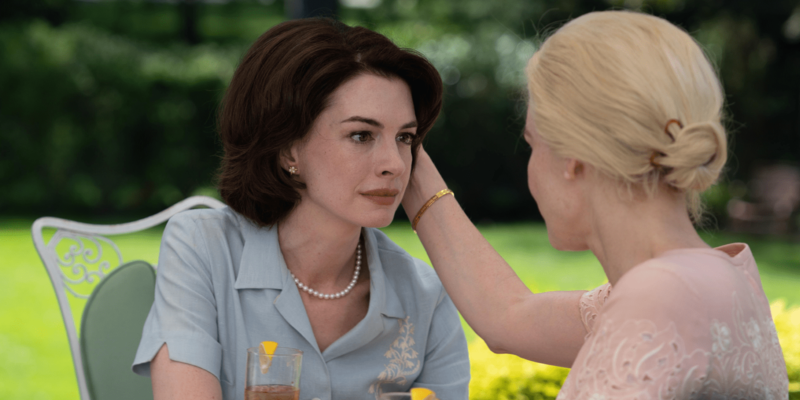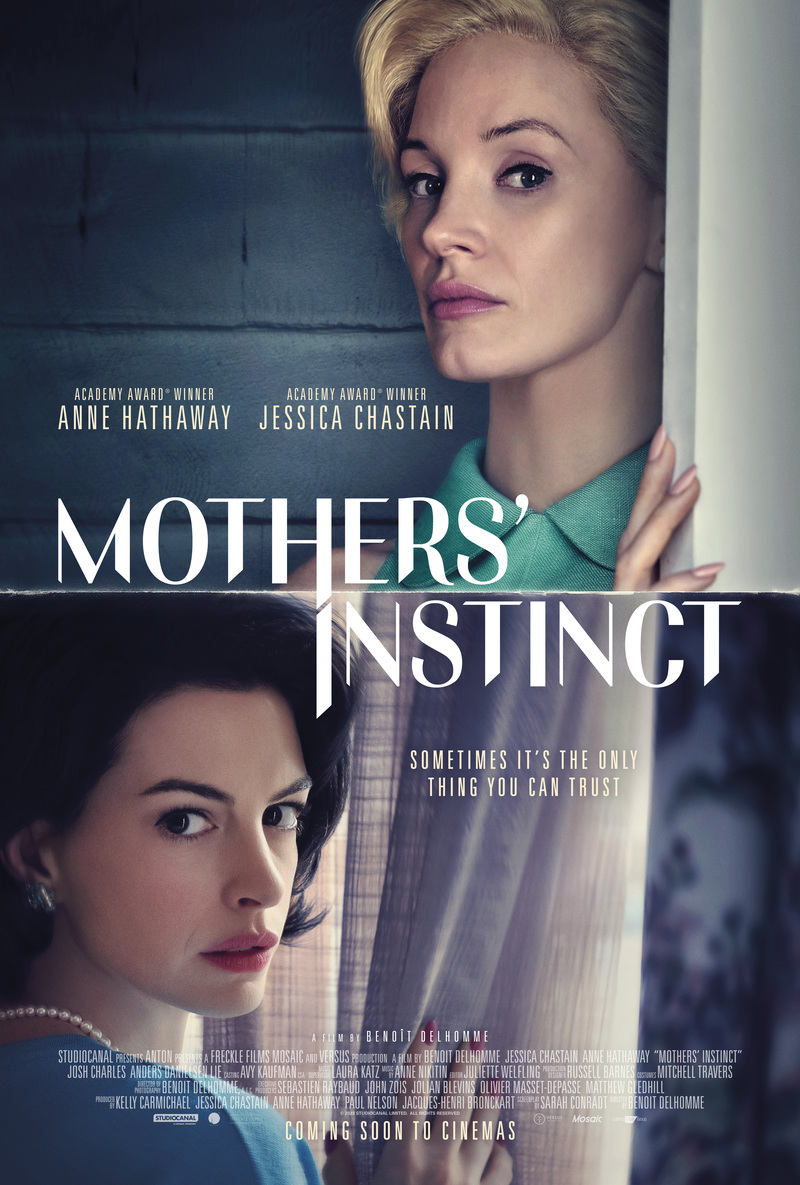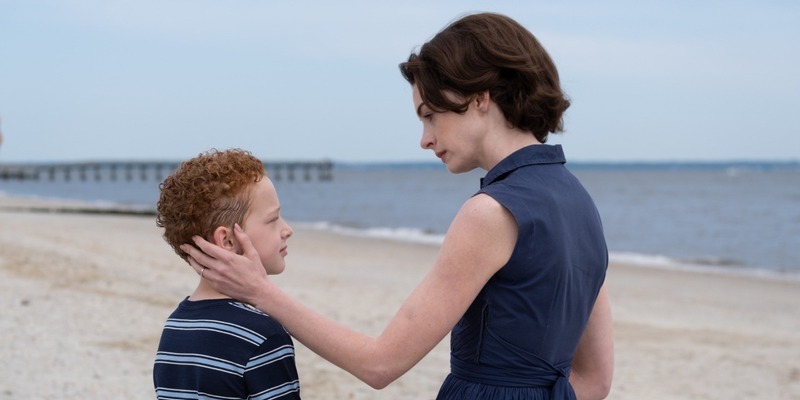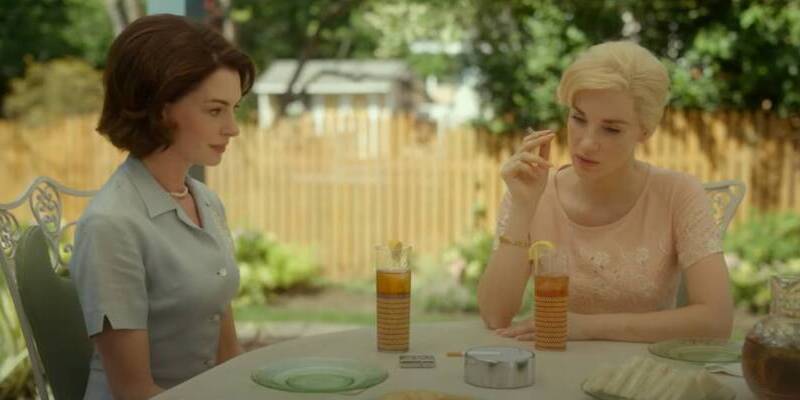
Review by
Benjamin Poole
Directed by: Benoît Delhomme
Starring: Anne Hathaway, Jessica Chastain, Anders Danielsen Lie, Josh Charles

Revisiting the best mainstream American film made in the late 1970s (Grease) for the 3000th time the other night (every time I watch it I catch
something new; like the infinite comedy detail of a Sergio Aragones'
comic strip there is so much going on in each frame), I was thinking
about how the film presents its version of 1950s America. You have to
laugh: when I was little and loved Grease I didn't really
clock its period setting. It was a film released before I was born, and
as a child I just assumed it depicted America's recent past (I was a
happy minded boy). Of course, as adults we recognise and celebrate the
constructed artificiality; the shiny façade of chrome and pink, of
hyperbolic gender roles, the totemic fashion; a glossed carapace within
which nestled a desperate nostalgia and poignant rumination upon the
serious social dynamics of late adolescence. "What was banal can, with
the passage of time, become fantastic," asserts Sontag in 'Notes on
Camp', and fantastic Grease most defiantly is. With its
middle-aged actors playing kids, bravura drops into song, and wholesome
implication that everyone is in on the joke the audience are gleefully
positioned to observe the world "as an aesthetic phenomenon."
Watching noir-ish melodrama Mothers' Instinct, veteran cinematographer Benoît Delhomme's directorial debut,
you experience that same dizzying sense of remove, of simulacra and
slipping across exquisitely shaped yet hollow surfaces. A remake of
2018's Belgian movie, which was in itself an adaptation of
Barbara Abel's 2012 novel, Delhomme's film comes already
pre-equipped with prior associations, further impersonating what has
been previously established. I've not seen Olivier Masset-Depasse's
predecessor, but the trailer suggests Delhomme took a shot for shot
approach which would have Gus Van Sant sagely nodding. Even before
Mothers' Instinct's diegesis offers its candid iconography of looking glasses, windows
and polished exteriors, a mimetic nature and theme of counterparts is
inherent.

The concept is advanced within the narrative, which efficiently
establishes Anne Hathaway (Céline) and
Jessica Chastain (Alice) - what is the first word of that title
again, etc - as neighbours, living in a parallel proximity within an
idealised suburban America of the 1960s. The cast names are prioritised
because Mothers' Instinct is predicated on performance,
with reference to the dependably superb work of these excellent actors
yet also the synergous plot. This is a world where appearance - the
keeping up of it with flawless dress, immaculate housekeeping, and
kitchen goddessry - is imperative to being a successful woman (the only
thing in the film more attractive than our Jess is Céline's set of Nick
and Nora cocktail glasses, which I immediately coveted). The ultimate
actualisation of this predisposed archetype is, of course, being a
mother, and, in keeping with the film's characteristic duality, both
Céline and Alice have sons of around eight. Early on we learn that
Céline, following a birthday, a date which after the age of 25 becomes
less a celebratory occasion and more a reminder of nature's mowing
scythe, cannot have more children. At least she has Max, though. Shame
if anything happened to him...
And, of course, it does (this may be a spoiler-?- as the marketing seems
to exclusively, and understandably, play on the appeal of its iconic
stars, rather than story), as the poor kid falls to death while
attempting to fix a bird box to his balcony. Alice is unfortunately
witness to the accident, and, via a queasy displacement of guilt and
fury, Céline holds her culpable.

I'm not sure if I quite subscribe to the old Laurie Colwin aphorism that
"friendship is not possible between two women one of whom is very well
dressed," but Mothers' Instinct certainly seems to. The
death of Max serves as a catalyst of what was already existent between
Alice and Céline: an accepted, tightly calibrated competition
masquerading as friendship. Thus, we progress into a Spy Vs. Spy (a
correlation exemplified by the binary monochrome of the characters' hair
colour) psychological dance of two steps forward, one step back reveals,
as the two contend within a hysteria-tinged mise-en-scene of twitched
curtains, desperately smoked cigarettes and purloined pharmaceuticals.
In the press screening, the film it most reminded us of was
Don't Worry Darling, Olivia Wilde's underrated misfire (reassessment due in around three
years' time), wherein the artificiality of its period setting was a
pictorial aspect of that film's nightmare of aspiration and identity.
The vivid ambience is recreated here, a lux pastel world of abundance,
domestic glamour and plastic smiles, familiar from mid-century American
mass market advertising campaigns. These commercials marketed a
lifestyle which Mothers' Instinct displays wholesale, yet
it is a hyperreality which we recognise now as confected, presenting a
mythological America which never actually existed.

Screenwriter Sarah Conradt-Kroehler's relocation of Abel's novel
to America consolidates the uncanny remove, as does
Ernesto Solo's absolutely gorgeous art design. Along with the
aforementioned glassware, you will too swoon at Mitchell Travers'
costumes: my top three of Jess's are the bright yellow summer dress she
witnesses the accident in, the thickly vertical pink striped bodycon in
which she hosts her son's birthday party, and a completely outrageous
off the shoulder quilted tattersall cardigan she just so casually swans
about in as it all hits the fan later on (and, yes god help me, her
funeral get up is fucking boots, too). Jess is, as ever, resplendent,
with lots of expressive close ups and extended sequences which showcase
her imperial beauty. Chastain is uniquely suited to the woozy
deracination of Mothers' Instinct because her angled
elegance is so otherworldly, almost parodic in its divaricating glory.
Talk about aesthetic phenomena, etc.
The problem with Mothers' Instinct is that while all of
these (surely deliberate) camp signifiers are going on and the
performances extend to glorious histrionics, due to its upsetting plot
trigger the film can never fully relax into the mode. After all, the
plot is predicated upon the worst thing you can ever imagine happening,
with the continuing film essaying the awful and insurmountable
ramifications of a mother's grief (perhaps the novel, regarding its
early '60s setting and sinister liaisons, was shaped by a Patricia
Highsmith influence, encompassing the author's black humour?). There is
no fun in Mothers' Instinct's proposal otherwise, despite the lustre: it's as if when Mrs Kitner
confronts Martin Brody, Spielberg is nudging us to notice how fabulous
she looks. The position of women is paid lip service when Alice wonders
"Is it enough for you, this life?," more to herself than Céline, and the
film does pointedly name check the bluff optimism of Kennedy's
presidency, but these ideas disappear quicker than a work-all-day
husband's pre-dinner Old Fashioned. Thus,
Mothers' Instinct suffers from an odd stasis, the affected
sensibility subsuming true feeling while its grim implications rob us of
arch pleasure; to return to Sontag, it is ultimately a failed
seriousness.

Mothers' Instinct is on UK/ROI
VOD now.

